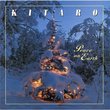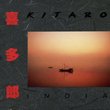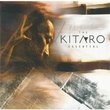| All Artists: Kitaro Title: Astral Voyage Members Wishing: 0 Total Copies: 0 Label: Dgc/Geffen/Reunion Release Date: 3/9/1989 Genre: International Music Style: Number of Discs: 1 SwapaCD Credits: 1 UPC: 020642408224 |
Search - Kitaro :: Astral Voyage
CD DetailsSimilar CDs
|
CD ReviewsDebut album and I believe his finest, of what I've heard fro BENJAMIN MILER | Veneta, Oregon | 03/29/2006 (5 out of 5 stars) "Astral Voyage was first released in Japan in 1978 under the title Ten Kai (the original LP also gave the English title of Astral Trip). This album got released in the United States in 1985 with the the slightly altered Astral Voyage title (but doesn't matter since "Ten Kai" pretty much translates the same), when he was signing up with Geffen Records to break through the American market. The cassette version has this gold print with the album title and artist name printed on the plastic casing itself, so if you own the Geffen cassette and don't have the print on the casing, you probably have a version where someone replaced the casing (after all cassette casings do have a habit of breaking even if just dropped by accident). Prior Ten Kai, Kitaro was a member of a prog rock band called Far East Family Band, in which he was going under his real name, Masanori Takahashi. The group released The Cave: Down to the Earth (1975), the English-language version called Nipponjin (1975, which also omitted a couple of songs in favor of a song from a band called Far Out, which was one of Kitaro's bandmate's previous bands) and Parallel World (1976) before jumping ship for a solo career. Far East Family Band continued for one more album without him and with a shortened and altered lineup for the album Tenkujin (1977). Although I've seen sources that states that Oasis was his debut and released in 1976, it was actually a 1979 release, so Astral Voyage (Ten Kai) was actually his first. In my opinion, this is perhaps one of his less New Age-y, more experimental albums. He really created some really nice and interesting Moog sounds, plus he tended to use a lot of Solina string synths here. There's also use of acoustic guitar and sitar, and he does tend to explore some World music here, when he does, it (unsurprisingly) has a strong Asian feel. One cut has Koto, with an obviously Japanese feel (meaning Kitaro was exploring his Japanese roots there, no surprise), to another more Chinese-influenced number. But throughout all that, the synthesizers are quite present and the album is quite electronic. It's too bad this album really gets overlooked. He never even bothered to perform any of this live (his 1980 album In Person Digital only bothers with the Silk Road and Oasis albums), or include any of this stuff on compilations. Great stuff and if you can get a copy, it's really worth it." Close your eyes, sit back and be ready for anything K. Bullock | Modesto, CA | 05/07/2009 (5 out of 5 stars) "this is what i call a "geeking out" album...i first heard it when i was 12 and was a competitive athelete...i would meditate to the album before i would compete. there are still songs on here that make me emotional. i should know, 15 years later, it still makes me teary! LOL!"
|




